Essay On Work Ethics (Outline/Structure)
- Introduction
- Types of Work Ethics
- Significance of Work Ethic
- Advantages of Work Ethic
- Factors and Characteristics involved in Work Ethic
- FAQs
Introduction
Work ethic is a behavior based on principles of hard work and diligence. It involves working diligently with a dedication to achieving desired goals. Work ethic is usually associated with the worker’s commitment to the job, his or her ability to stay focused, and willingness to do whatever it takes to get the job done. A strong work ethic can lead to job satisfaction, increased job security, and more opportunities for advancement.
Types of Work Ethics
Work ethic can vary from person to person, depending on their beliefs, values, and cultural backgrounds. The most popular types of work ethic are:
1. Self-Motivation:
This type of work ethic requires an individual to be motivated by their own goals and objectives. Self-motivated individuals can stay focused on achieving their desired outcome with little or no external motivation or pressure from others.
2. Teamwork:
This type of work ethic involves working together as a team to achieve common goals and objectives. Teamwork encourages collaboration, communication, and problem-solving skills to reach a mutual goal.
3. Integrity:
This type of work ethic focuses on doing what is right and honest, even when it might not be popular or accepted by others. Individuals with an integrity-based work ethic will remain committed to their principles and values no matter the circumstances.
4. Respect:
This type of work ethic focuses on treating others with courtesy and respect, regardless of their position or rank. Individuals with a respect-based work ethic are willing to recognize the contributions of all team members and understand the importance of collaboration in achieving shared goals.
Significance of Work Ethic
The benefits of having a strong work ethic are numerous. An individual with a positive attitude and commitment to their job can achieve more than someone who is merely “going through the motions” each day. Work ethic translates into higher productivity, increased customer satisfaction, better performance reviews, greater job security, and career advancement opportunities.
Advantages of Work Ethic
Having a strong work ethic has many advantages for both the individual and the organization they are employed. Work ethic can help an individual become more successful in their career, as it instills a sense of dedication, responsibility, and pride.
Employers also benefit from having employees with a strong work ethic as these individuals tend to be more productive and reliable. Furthermore, a good work ethic can help foster better team morale, as employees with strong work ethics tend to be more supportive of their colleagues.
Discover More:
Characteristics involved in Work Ethic
Work ethic is largely dependent on an individual’s values, beliefs, and attitudes toward their job. The following characteristics are important in developing a strong work ethic:
1. Motivation:
Having the drive and ambition to strive for excellence.
2. Accountability:
Being accountable for one’s actions and taking responsibility for mistakes.
3. Discipline:
Adhering to company rules, regulations, and policies.
4. Resilience:
Possessing the ability to remain positive and motivated in challenging situations.
5. Dedication:
Being dedicated to one’s job and willing to go the extra mile when needed.
6. Integrity:
Acting honestly, ethically, and with integrity at all times.
7. Perseverance:
Having the courage and determination to keep going despite any setbacks.
8. Professionalism:
Maintaining a professional attitude and appearance at all times.
9. Dependability:
Being reliable in one’s work performance.
10. Adaptability:
Possessing the ability to adapt quickly to changing situations or circumstances.
Work ethic is a term that encompasses an individual’s attitudes, beliefs, and behaviors toward their job.
It is important to note that work ethic is not only about working hard but also about having the right attitude and commitment to succeed in any given workplace. Developing a strong work ethic can help individuals become more successful in their careers and can also be beneficial for employers who have employees with a positive attitude and dedication to their work.
The significance of work ethic cannot be understated, as having an individual with good values, beliefs, and behaviors can make all the difference in an organization’s ability to succeed.
Those who take pride in their job, strive for excellence and demonstrate a strong commitment to their work will be the ones who stand out and receive the most recognition in any given workplace. Ultimately, having a strong work ethic is key for anyone looking to achieve success in their professional life.
Factors involved in Work Ethic
Following Factors are present to demonstrate a strong work ethic.
1. Determination:
Having the determination and dedication to continually improve performance.
2. Initiative:
Taking the initiative to solve problems and complete tasks.
3. Professional Development:
Investing in one’s professional development to stay ahead of the competition.
4. Time Management:
Managing time efficiently and effectively to meet deadlines.
5. Prioritization:
Prioritizing tasks properly to maximize productivity and minimize stress levels.
6. Conflict Resolution:
Dealing with conflicts effectively and professionally.
7. Communication:
Communicating effectively with colleagues, superiors, and clients.
8. Agility:
Being agile and quick to respond to urgent situations or circumstances.
9. Decision Making:
Making sound decisions efficiently and objectively.
10. Loyalty:
Being loyal to the company and exhibiting a sense of commitment and dedication.
11. Respect:
Showing respect for colleagues, superiors, and clients at all times.
12. Teamwork:
Working well with others to achieve common goals.
13. Creativity:
Thinking outside the box to come up with innovative solutions.
14. Organization:
Being organized and able to multi-task to meet deadlines.
15. Leadership:
Possessing the necessary leadership skills to lead teams effectively.
16. Problem-Solving:
Identifying problems and coming up with creative solutions quickly and efficiently.
17. Self-Motivation:
Motivating oneself to perform better and reach higher levels of success.
FAQs
What does ethic mean?
Ethics is defined as a set of moral principles or values that govern the conduct of an individual or group. It’s also used to refer to someone’s behavior and attitude towards their job, or their overall work ethic.
What is a good work ethic?
A good work ethic is an attitude that values hard work and diligence. This includes qualities such as determination, initiative, professionalism, respect, integrity, and punctuality. Having a strong work ethic is essential for any job or career path.
Is work ethic a value?
Yes, work ethic is a value. It is an attitude that values hard work and dedication to one’s job or task. Having a strong work ethic can help individuals become more successful in their careers and can also be beneficial for employers who have employees with a positive attitude and commitment to their work.
What are key working skills?
Key working skills include determination, initiative, professional development, time management, prioritization, conflict resolution, communication, agility, decision-making, loyalty, respect, teamwork creativity organization leadership problem solving, and self-motivation.
Essay On Work Ethics (PDF & Infographics)
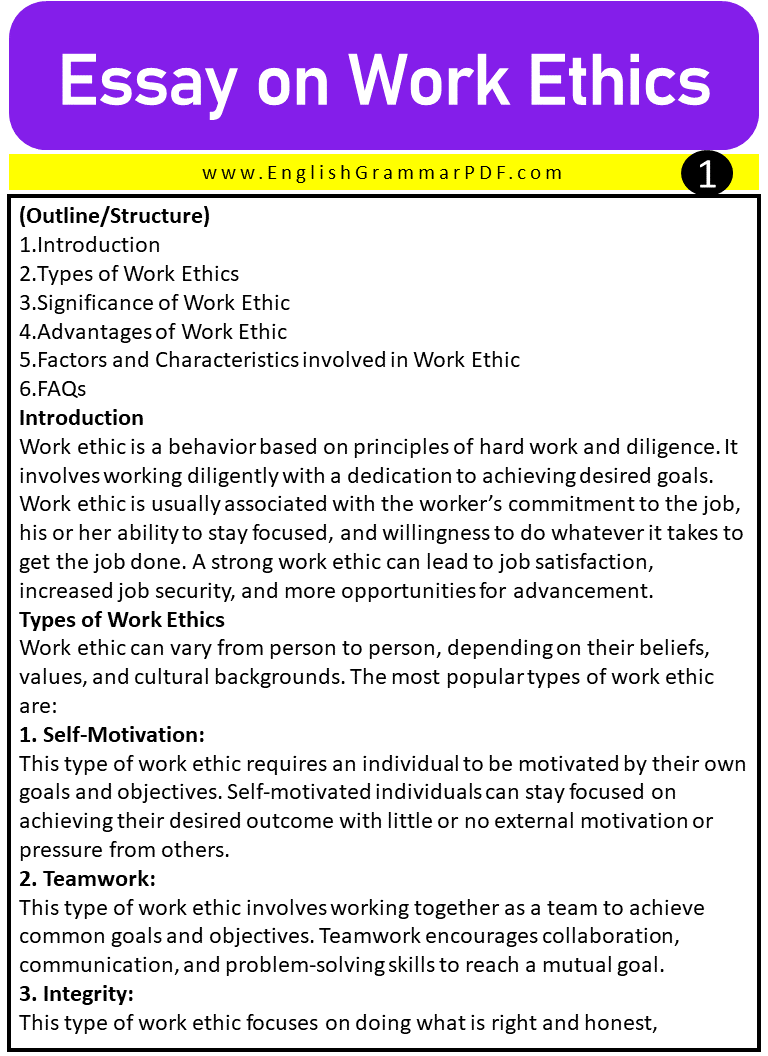
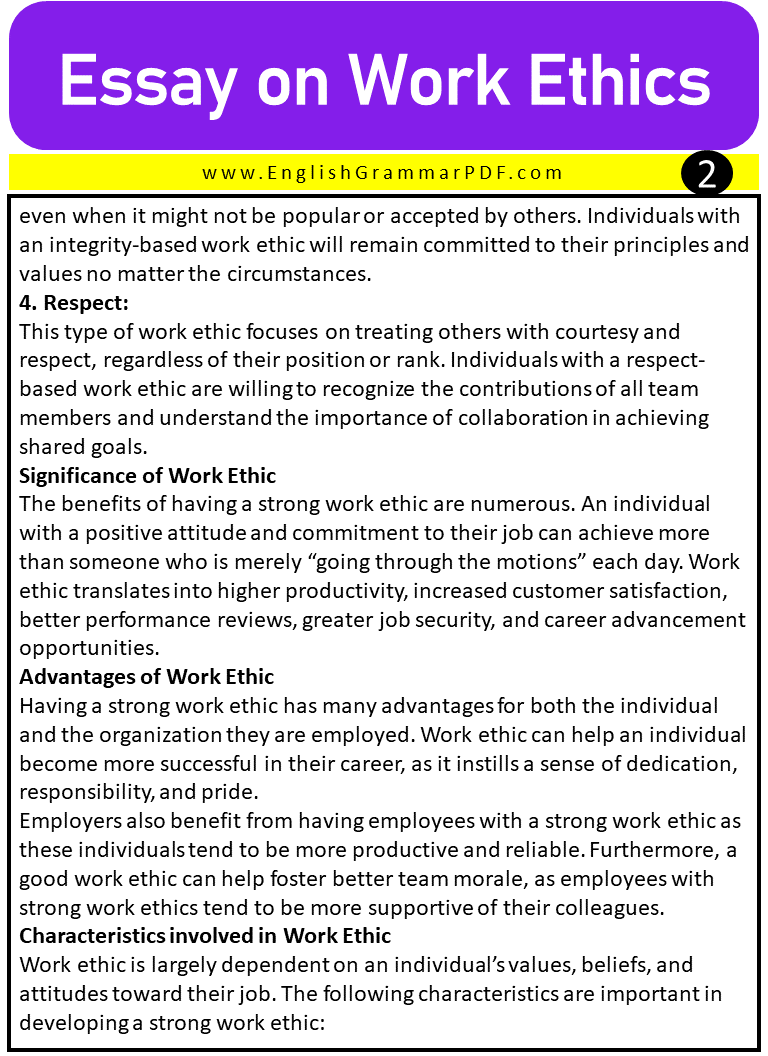
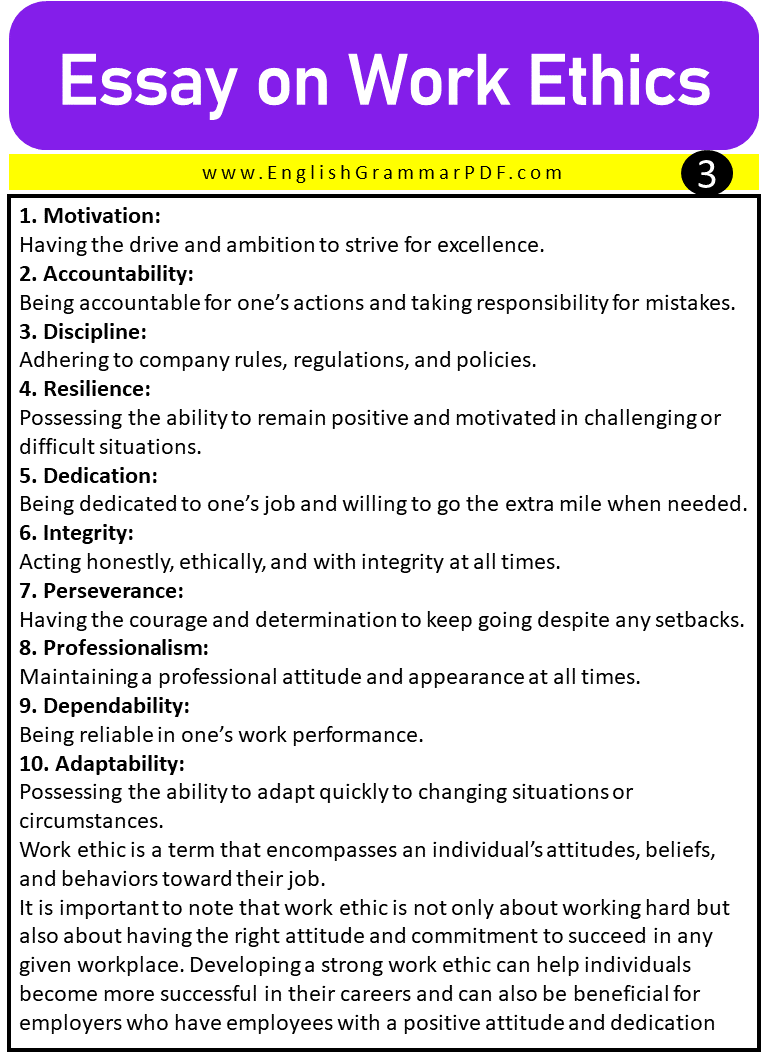
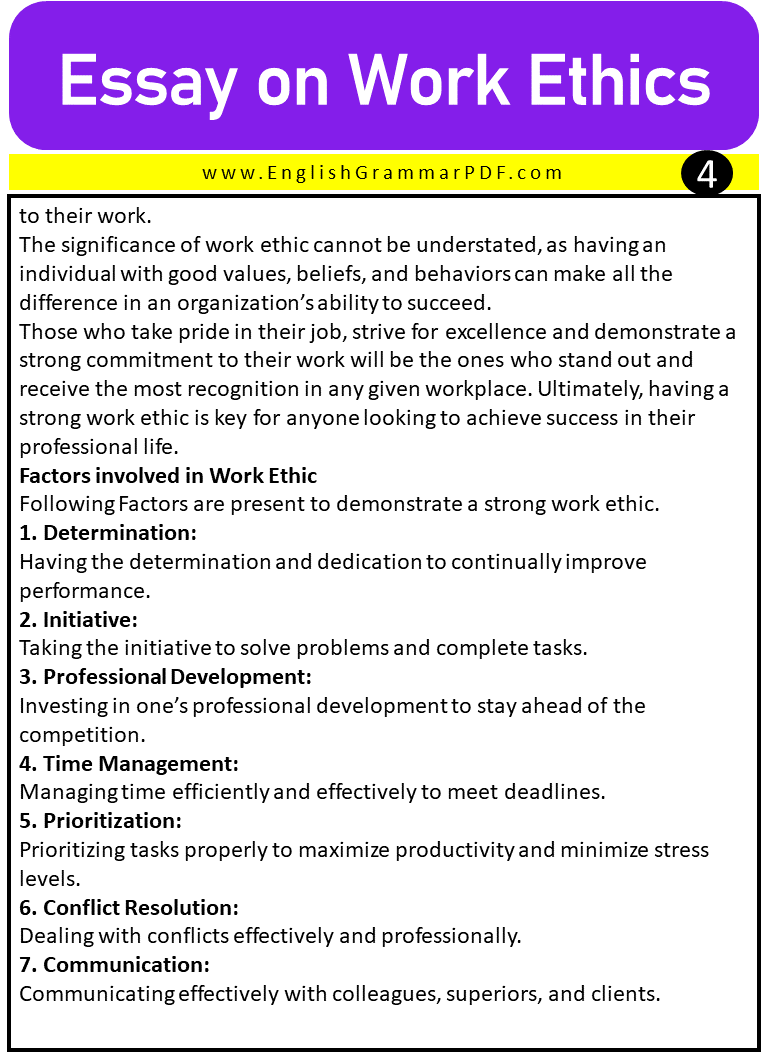
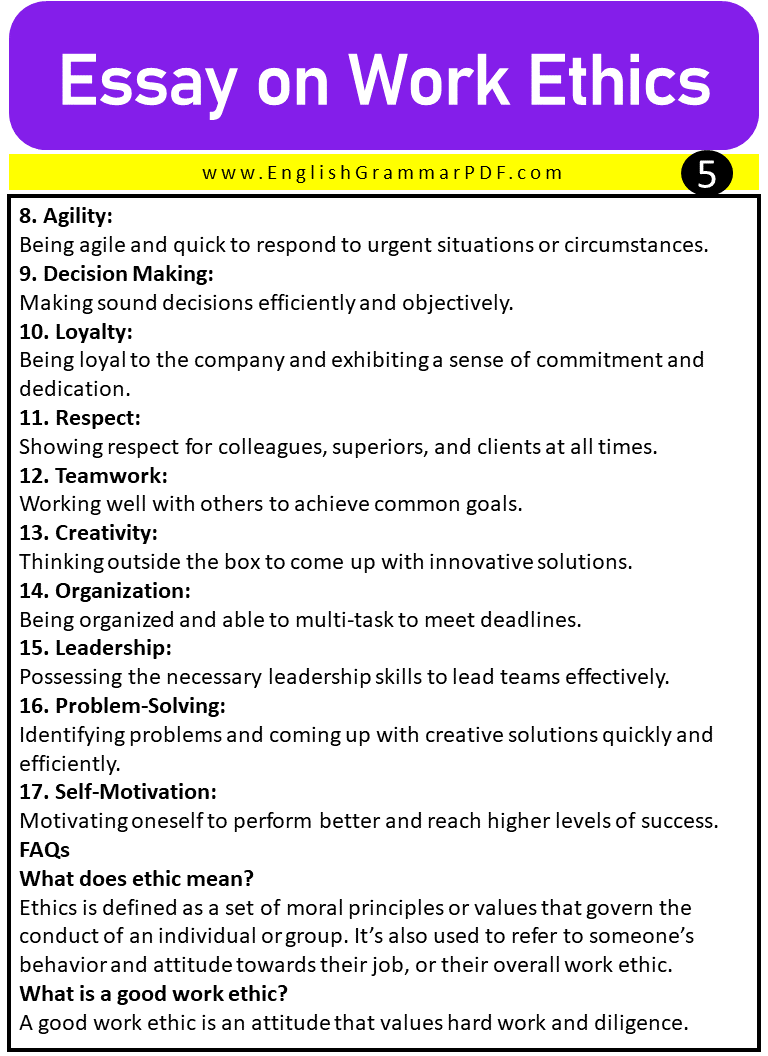

Below is the PDF of this Essay.


